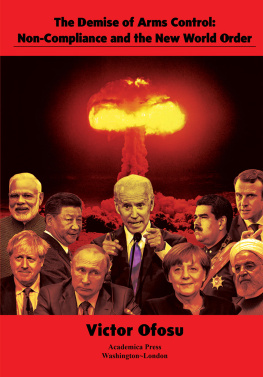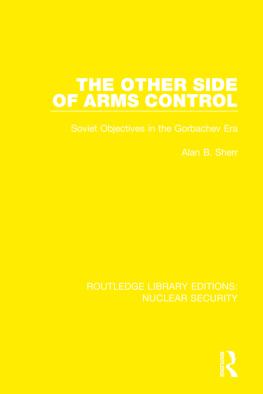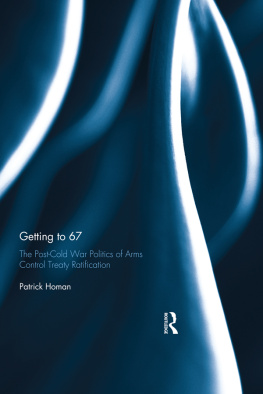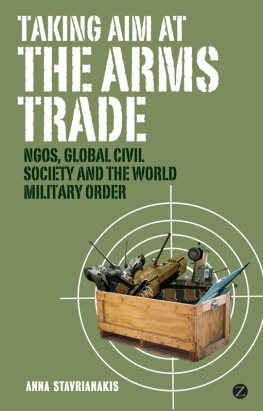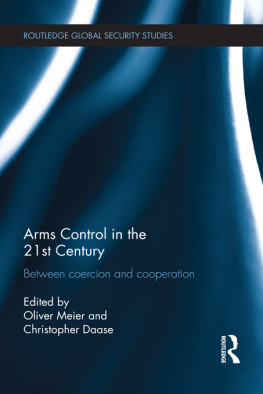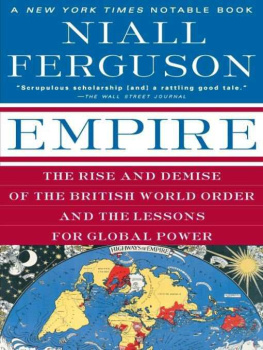Library of Congress Cataloging-in-Publication Data
Names: Ofosu, Victor (author)
Title: The demise of arms control : non-compliance and the new world order | Victor Ofosu
Description: Washington : Academica Press, 2021. | Includes references. Identifiers: LCCN 2021933342 | ISBN 9781680539165 (hardcover) | 9781680538205 (e-book)
Copyright 2021 Victor Ofosu
Introduction
The end of the Cold war was embraced with an expectation of the prospect of peace across the globe. The end of the cold war saw the emergence of the United States as a unilateral superpower. At the end of the cold war era, the notion of peace was ignited by a speech delivered by U.S president George H.W Bush. During Bushs address at the U.S Congresss joint session on September 11, 1990, he highlighted the vision for the New World Order. In his speech, it was evident that he saw a new era free of terror and the prospect of prolonged peace. Bush believed that the era commencing the cold war should welcome the pursuit of justice and a quest for peace.
To Bush, the new world order recognised the world in which large and small countries could co-exist. A world in which nations from the West, East, North, and South can prosper in a continuous harmonious international system. The worlds populations expected that the end of the cold war would promote peace and strengthen partnerships between nations. The end of the cold war was of great importance in arms control. The end of the bipolarity of power which was a struggle between the United States and the Soviet Union, which amongst other matters was the causation for the division of Europe, meant that the issue concerning nuclear proliferation could be laid to rest. With the United States as the Unilateral superpower that has assumed the position for policing the world, there were optimistic speculations that nations may reverse their nuclear weapon posture. The United States effort led to their promotion of a policy of good intention. These policies were aimed at promoting democracy and exposing the world to Western values. These policies were vital in addressing the fundamental challenges facing the world at the time. Such was the case as states such as South Africa, Argentina and Brazil were able to reverse their nuclear posture through a series of negotiations and observe a normalisation process between states and states actors. The book forms the opinion that it can be suggested that many states embraced Bushs speech.
When examining international security today, one can argue the emergence of the new cold war. The new cold war is not about the survival and management of the world by two powerful states, but it has multiple players. Today the United States is challenged by the economic and military powers of states such as China and Russia, Brazil, and India. Countries such as North Korea and Iran are also poised to protect their economic and security interest in their respective regions. The world has again found itself in a state of anarchy in which proliferation becomes the means for states to guarantee survival. Tension in international security has contributed to states forging alliances to protect their interest. These alliances are not of the positive kind, but an alliance that has brought about a division in the world order. The troubling times in international security spells out the failure of the new world order. Our troubling time indicates the emergence of new world order, a world order different from the order described by the United States President George H. W Bush on September 11, 1990. The United States failure to successfully police the world and maintain its unilateral power alludes to the notion of its gradual decline that threats from states such as China and Russia have contributed to the United States revising its geo-security strategy. As international security is in a state of anarchy, it is expected that most states, including the United States, Russia and North Korea, may not comply with an international agreement to either reverse their nuclear posture or to reduce their stockpile of nuclear weapons. Although it is yet to assume its shape, a New Order has emerged; one can argue that we live in a multilateral order of international security. In our current state, the masters of the New World Order are concentrating their effort on maintaining or becoming the new superpowers. This order places the world population in grave danger. The presume danger calls for a new way of managing international security. This method comprises a multilateral negotiation between states. A multilateral negotiation amongst states to ensure compliance in international agreements.
Over the years, the United States has attempted to denuclearise North Korea. The United States sees North Koreas nuclear postures as a threat to its alliance and its interest in the Korean Peninsula. Attempts to denuclearise North Korea contributed to the development of the Six-Party Talks. The first chapter of the paper examines the Six-Party Talks. The Six-party Talks are examined from the North Korean perspective. That is understanding the benefits of the talks to North Korea. It is also necessary for North Korea to negotiate or denuclearise through an agreement reached during the talks. The analysis projected examines the benefit of the negotiations from a security and economic perspective. Here there is a critical evaluation of factors that can either deter or encourage North Korea to denuclearise. The chapter offers a background of the Six-Party Talk. It explains the parties involves in the talk. As there are issues concerning the talks security and economic benefits favouring North Korea, the book examines the security model of arms control. The model forms the premise of the authors analysis of his intention to understand the Six-Party Talks benefit to Pyongyang.
Chapter two of the book examined compliance and non-compliance in arms control. This chapter critically investigates North Koreas non-compliance with international agreement. The chapter defines the terms non-compliance and compliance. Towards understanding the significance of compliance in arms control and why states may comply with international treaties, the chapter applied Simmons and Von stein analysis and Understanding of treaties constraining effects. The adaptation of Simmons and Von steins arguments also provides an insight into factors that may contribute to states breaching their treaty obligations. In this chapter, the authors analysis observes the extent to which the Six-Party Talk may constrain North Korea in its pursuit of both its economic and security interest. Indeed, the role played by states actors toward Pyongyang complying with international arms control treaties is investigated by the chapter.
The continuous war between North and South Korea has destabilised the Korean Peninsula. The regions ongoing issues have affected states such as China, Japan, Russia, and the United States. Understanding the history of the Korean Peninsulas turbulent nature calls for the need to explore solutions that can end the war. Due to the current instability in international security, leaving the issues unaddressed can escalate into a nuclear war. Chapter three examines the different measures applied through the Six-Party Talks to end the war between North and South Korea. De-escalating tensions in the region requires all parties partaking in the negotiations. Indeed, the book understands that the strategy can further escalate tension in the region. In the chapter, the author applied a limited war scenario to explain a possible outcome if the Korean Peninsula war is not terminated. The book analyse the definition of the term war. The book also defines war termination, hoping the definition will provide an in-depth insight into the subject under consideration. Factors contributing to the war termination are identified and examined by the chapter. The analysis of the identified factors includes the external and internal cost of war termination. The influence of both international actors and states actors in terminating the war is examined in the chapter. Also, the author will employ cost-benefit analysis to examine how states might negotiate the end to limited nuclear war.

